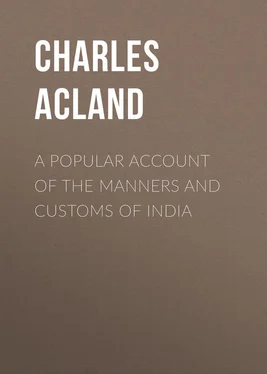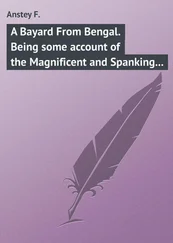Charles Acland - A Popular Account of the Manners and Customs of India
Здесь есть возможность читать онлайн «Charles Acland - A Popular Account of the Manners and Customs of India» — ознакомительный отрывок электронной книги совершенно бесплатно, а после прочтения отрывка купить полную версию. В некоторых случаях можно слушать аудио, скачать через торрент в формате fb2 и присутствует краткое содержание. Жанр: foreign_antique, foreign_prose, Путешествия и география, на английском языке. Описание произведения, (предисловие) а так же отзывы посетителей доступны на портале библиотеки ЛибКат.
- Название:A Popular Account of the Manners and Customs of India
- Автор:
- Жанр:
- Год:неизвестен
- ISBN:нет данных
- Рейтинг книги:5 / 5. Голосов: 1
-
Избранное:Добавить в избранное
- Отзывы:
-
Ваша оценка:
- 100
- 1
- 2
- 3
- 4
- 5
A Popular Account of the Manners and Customs of India: краткое содержание, описание и аннотация
Предлагаем к чтению аннотацию, описание, краткое содержание или предисловие (зависит от того, что написал сам автор книги «A Popular Account of the Manners and Customs of India»). Если вы не нашли необходимую информацию о книге — напишите в комментариях, мы постараемся отыскать её.
A Popular Account of the Manners and Customs of India — читать онлайн ознакомительный отрывок
Ниже представлен текст книги, разбитый по страницам. Система сохранения места последней прочитанной страницы, позволяет с удобством читать онлайн бесплатно книгу «A Popular Account of the Manners and Customs of India», без необходимости каждый раз заново искать на чём Вы остановились. Поставьте закладку, и сможете в любой момент перейти на страницу, на которой закончили чтение.
Интервал:
Закладка:
Midnapore, November 11, 1842
A friend has just made me a present of a very small kind of monkey, about nine inches high, of a light-brown colour. His antics are often very amusing. I fasten him by a chain to a thick pole in the compound, at the top of which is his house. He will sometimes turn his waterpot upside down and sit on it in the gravest possible manner. He will then perhaps stoop down and gather a blade of grass, and examine it as attentively as though he were inquiring to what species and genus it belonged. Perhaps by this time several large knowing-looking crows, something like English magpies, will have collected round him, holding their heads on one side and looking as if they were listening very attentively to his lecture on botany. Presently you would see the sly little monkey turn his eye to see how near they are, and then with one bound he will catch hold of the nearest crow by the neck; but the crow is the stronger of the two and always gets away safe. These crows are as common as sparrows and quite as tame, for they will hop into the verandah and pick up anything the parrots drop. We have two parrots; they are of a kind very common here; so I told a man to go out and catch me a couple, as I wanted to teach them to talk. He did so, and they are now getting very tame. I gave him a few pice for his trouble. They are of a kind that I do not remember ever to have seen in England. The upper mandible is red, the lower black. From the lower mandible extends on each side a broad black stripe, to where we suppose the ears to be; and there is another black stripe from one eye to the other. These stripes give the bird a very peculiar appearance. The upper circle resembles a pair of tortoiseshell spectacles.
I had a young hyæna given to me, which I made every endeavour to tame, giving him milk and food, but nevertheless as soon as I approached he flew at me. As he has scarcely any teeth I did not fear him, but took him in my arms, being careful to keep a tight hold on his neck. He slept during the day, but showed an inclination to go out at night, but, not being permitted to do so, continued making the most extraordinary noises resembling the sobbing of a child in pain. The servants were all afraid of him. Having kept us awake that night, I resolved the next to try him outside the house, and accordingly, fastening him up, I gave him a box to sleep in. The next morning I found he was dead. The servants declared he had been killed by a pack of jackals, but I shrewdly suspected they themselves to have been guilty.
The other day I caught one of those beautiful little squirrels which I have before described. It is grey, with a broad yellow stripe down each side. The body is about as big as my thumb, and the tail the size of my middle finger. I borrowed a common squirrel's cage, but the little thing was so small that it immediately struggled through the wires, and the mungoose, perceiving it, killed and devoured it. A great many of them live in the thatch of our house.
The musk-rat is a small sharp-snouted animal, from which musk may be extracted. The scent rising from it is overpowering. All the houses here swarm with them, but the mungoose has either killed or driven away all that were here, and our house therefore is quite free from the smell. The mungoose is very destructive. I just left the room for a few minutes, and while absent it commenced demolishing some eggs which I had brought in from the fowl-house: there were eight on the table; he had broken five over my papers and then dipped his paws in the ink and ran over the table. Whilst punishing him for this fault I held him by the neck, but he nevertheless managed to give me a severe scratch with his claws. He is a thorough beast of prey, and will eat nothing but animal food except sugar.
The prawns here are most delicious, and many of them are as large as a good-sized lobster. I was crossing my compound in the dusk a few evenings ago, after feeding my fowls and ducks. I walked slowly, thinking of England and my children, when I happened suddenly to cast my eyes upon the ground. I started back on perceiving within two paces of me the dreaded cobra de capello – its head raised, its hood expanded, and manifesting every sign of anger. Two, or at most three, steps more, and I should have trodden upon it and received the fatal bite. Unfortunately I had no stick in my hand; I called the servants to bring bamboos, but by the time they came it had glided into its hole, and I went home thanking the Supreme Being who had saved me from the fearful danger. Since that time I have not been out without a large bamboo in my hand, for, although I have stopped up the hole, yet the cobra de capello is, no doubt, still in my compound. The bite of this snake is most deadly.
During the last fortnight I have heard of three persons having been killed by it in Midnapore. Two of them were hunters, the other was one of the wives of the Rajah. She put her hand into a cupboard to procure something, when a cobra, which had concealed itself there, bit her. When a person is wounded by this venomous reptile he generally expires within an hour. The only possible cure, and that is an uncertain one, is to swallow every few minutes a glass of brandy with some eau de luce, or smelling-salts, dissolved in it, while a man stands near beating you with a heavy whip. Or, instead of this, you may be fastened to a carriage and be compelled to run as fast as possible. The object is to keep you awake, for the danger of the bite consists in the heavy lethargy it produces. The remedies applied, however, are sure to bring on a violent fever, which frequently proves fatal. Few diseases in this country last longer than an hour or two. Fever, cholera, and inflammation of the liver, the three great scourges of India, commonly prove fatal within from two to twelve hours, so that no one can exist here without being constantly reminded of the uncertainty of human life. It is curious that I, who dreaded so greatly the reptiles of India, should have been at once sent to the station where they most abound, for there is probably no place in Bengal where serpents and lizards are so plentiful. Our house is infested by numbers of centipedes, which get on the chairs and on the clothes in a most unpleasant manner. However, we have neither of us yet been bitten.
I have not seen a scorpion alive. My wife and I were walking in the compound the other day, when we saw a very large snake looking at us through the hedge of aloes. It was of a light-brown, and was, I think, five or six feet long.
The other day my servants brought me in a venomous snake which they said they had killed in the compound; I took it up by its tail and carried it into my wife's dressing-room to show it to her. I laid it down on the floor, and soon it began to wriggle away, and, raising its head, turned at us. Fortunately there was a stick at hand, and, taking it up, I killed the animal with one blow. So great is the dread of them here, that no one ever sleeps without a light, lest, stepping out of bed at night, he should place his foot upon some venomous creature; most people keep a long bamboo in every room. We never put on our shoes without first examining well to see that there is nothing alive in them. The oil which we burn in the evening and at night is extracted from the cocoa-nut and has a most agreeable smell. For this purpose cocoa-nuts are brought from Ceylon and all the neighbouring islands. This oil could not be used in England, because it congeals into a sort of fat when the thermometer is at 64°.
We have a kind of root here which they call a yam, although I do not think it is one. It is brown outside and white within; about two feet long and thickest at the middle, where it is four inches in diameter. This they boil and then fry into lumps; it is exceedingly nice. Potatoes are scarce, dear, and bad, except sweet ones, which I like; they are very stringy, and taste like potatoes mixed with sugar.
Читать дальшеИнтервал:
Закладка:
Похожие книги на «A Popular Account of the Manners and Customs of India»
Представляем Вашему вниманию похожие книги на «A Popular Account of the Manners and Customs of India» списком для выбора. Мы отобрали схожую по названию и смыслу литературу в надежде предоставить читателям больше вариантов отыскать новые, интересные, ещё непрочитанные произведения.
Обсуждение, отзывы о книге «A Popular Account of the Manners and Customs of India» и просто собственные мнения читателей. Оставьте ваши комментарии, напишите, что Вы думаете о произведении, его смысле или главных героях. Укажите что конкретно понравилось, а что нет, и почему Вы так считаете.












